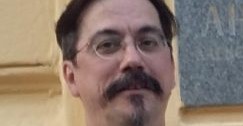Vasileios Basios, a physicist based in Brussels, has conducted interdisciplinary research on the foundations of complexity science and nonlinear systems. He is particularly interested to explore how consciousness interacts with aspects of the physical world.
Contents
Career
Vasileios Basios gained his PhD in physics in 2001 from the University of Brussels, then accepted a research position at the Interdisciplinary Center for Nonlinear Phenomena and Complex Systems at the University of Brussels. He has a deep interest in the transformation of science beyond the materialistic worldview and has published essays for the International Consciousness Research Laboratories (ICRL, the continuation of the PEAR laboratory) where he is a trustee.
He is a board member of the Scientific and Medical Network and the steering team of the Galileo Commission, also a member of the Academy for the Advancement of Post-materialist Sciences (AAPS).
Recently Basios has instigated collaborative research to investigate the behaviour of random event generators in hospital and in naturalistic settings. These experiments attempt to answer deep theoretical questions around ‘operational closure’ in organisms, by measuring non-local correlations between their behaviour and random processes.
Complexity and Consciousness
In a chapter in Being and Biology (2017), Basios suggests that reductionist thinking acts as a placeholder for complex empirical observations, pending more comprehensive models. As examples he points to biological evolution, in which a purely mechanistic view has been overtaken by the development of epigenetics, and to the superseding of Newtonian physics by quantum mechanics. Basios traces this evolution towards the emergence of a new kind of consciousness.1Basios (2017).
Gödel and Self-Reflection
Basios and Bouratinos take inspiration from Gödel in outlining how a self-reflective science of consciousness can open up new avenues of exploration. They argue that promoting self-reflectivity in scientific discourse would bring forth a post-materialistic, more inclusive and more humane, world-view.2Basios & Bouratinos (2006).
Swarm Intelligence
Basios and colleagues have been exploring the influence of changes of consciousness on the behaviour of random event generators (REGs). The aim is to investigate influences related to swarm intelligence, asking whether insects collectively act as ‘super-organisms’ and affect physical systems in a way that human intention seems to do. The project is named oREGano (Open Random Event Generator Analysis Organization) and is supported by ICRL and the Galileo Commission.
Hospital Investigations
Pairs of random event generators have been placed near dying patients in the intensive care unit of the University Hospital of Elche, Valencia, Spain. Close to recorded deaths, their output becomes increasingly ordered and correlated, appearing to reveal non-local influence of consciousness changes in a dying patient.3Personal communication.
Michael Duggan
Literature
Basios, V., & Bouratinos, E. (2006). Gödel’s Other legacy and the imperative of a self-reflective science. Horizons of Truth: Gödel Centenary, University of Vienna. Kurt Gödel Society, Collegium Logicum 9, 1-5.
Basios, V. (2017). Complexity, complementarity, consciousness. In Being and biology: Is consciousness the life force? ed. by B. Dunne & R. Jahn. Princeton, New Jersey, USA:.ICRL Press.
Basios, V. (2018). Foreword. In Science Objectivity and Consciousness, by E. Bouratinos. Princeton, New Jersey USA: ICRL Press.
